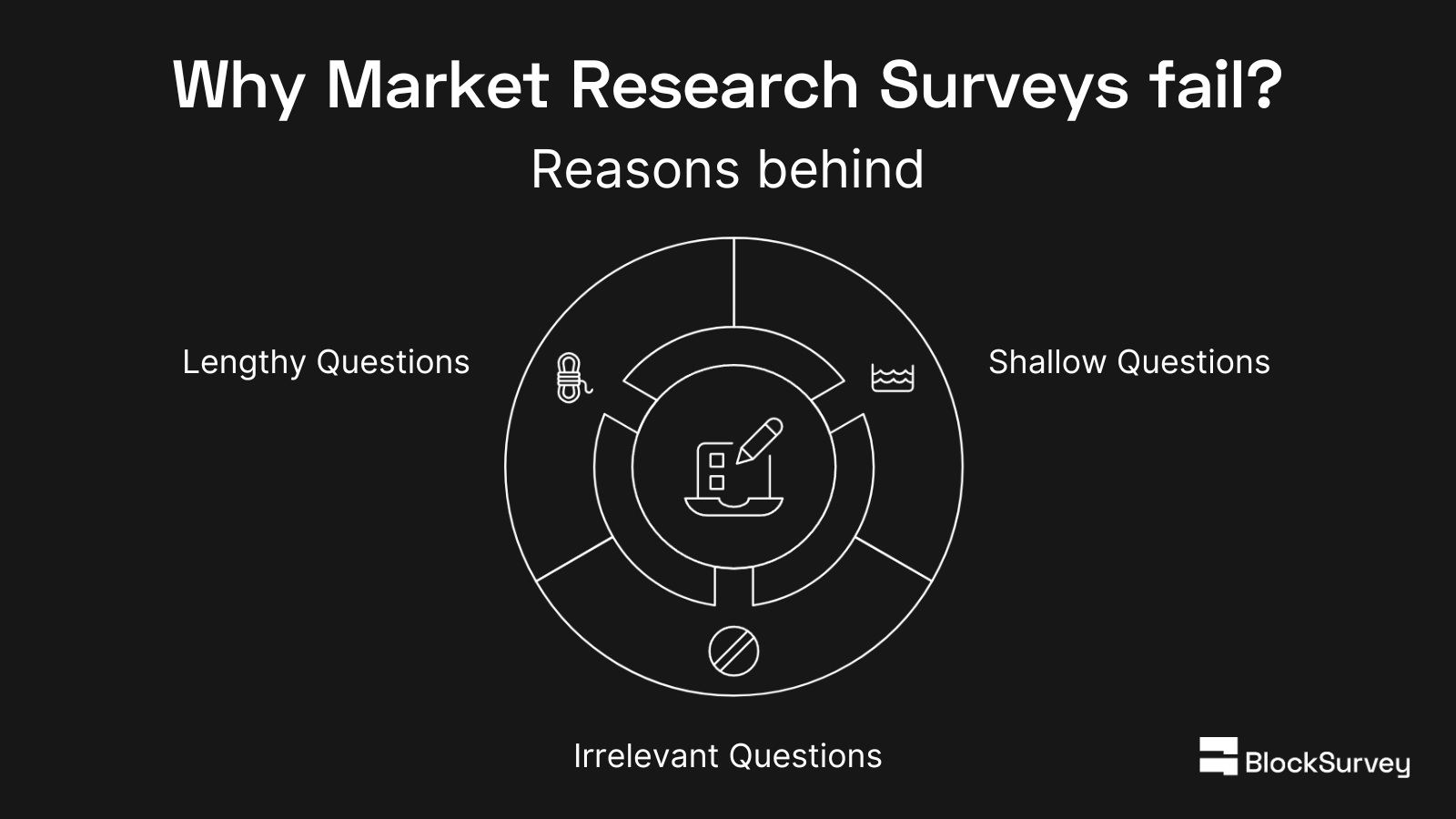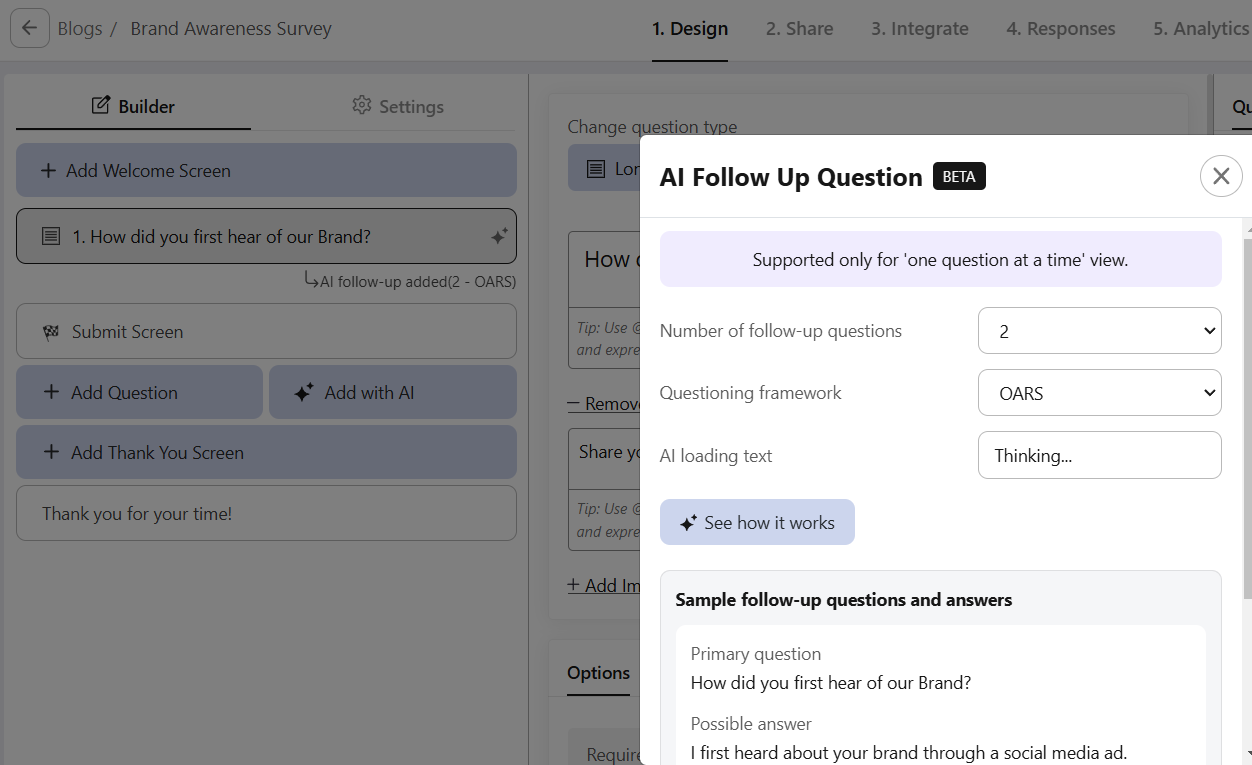Get insights.
Unlock value.
- 14-day free trial
- Set up in minutes
- No credit card required
From Ignored to Engaged: How AI Adaptive Questioning Improves Market Research Surveys?
As a Market Researcher, are you running surveys to understand competitor behavior, consumer behavior & market trends? Have you succumbed because of the growing problem of low engagement & survey fatigue among your respondents? Don’t worry. You are not alone.
Keeping your participants engaged in gathering meaningful market insights from surveys has become very important. But, how do you do that? Thanks to this revolutionary feature: AI Adaptive questioning is a solution to market researcher’s problem.
Dive in. Let’s delve more deeply into this unique feature: AI Adaptive questioning.
Wait! Before that, we need to know why market research surveys fail. Read on.
Why do Market Research Surveys fail?
Below are a few types of survey questions belonging to a “Brand Awareness Survey”. These questions fail to capture real market insights about the Brand. Let’s find out why.

Shallow Questions
“Have you heard of our Brand before?”
This question provides only basic information and does not delve into the depth of the respondent's perception of the brand.
Irrelevant Questions
“What is your favorite vacation destination?”
This irrelevant question does not contribute to understanding the respondent's perception of the brand, making it out of place in the Brand Awareness Survey.
Lengthy Questions
"When you think about brands in the industry, such as those that offer solutions similar to what we provide, how often do you recall hearing about or encountering our brand in advertisements, social media, word-of-mouth discussions, or other marketing channels over the past six months?"
While detailed, this question is unnecessarily long and could confuse respondents, making it harder to gather clear and concise data. It must be rephrased for clarity and brevity.
Privacy concerns & Survey fatigue are other reasons why market research surveys fail.
AI Adaptive Questioning can help with problems arising in the above discussion.
What is AI Adaptive Questioning?
AI Adaptive Questioning is a technique used in survey tools. It creates dynamic follow-up questions based on open-ended answers. This technique continues to probe the respondents with dynamic questions, to mine better insights. It does all these with the help of Generative AI.
In short, AI analyses a participant's response and determines the next most relevant question. That is, AI predicts & presents the question that yields the most valuable insights.
By continuously probing the respondent with adaptive follow-up questions, the market researcher gets valuable insights that are instrumental in making the right decisions. The data quality is higher. Moreover, this feature is highly flexible and can be used for any type of market research.
How Adaptive Questioning Helps Market Researchers?
AI Adaptive Questioning helps market researchers in many ways, a few of which are listed below.
Increased Personalization
Through adaptive or dynamic follow-ups tailored for each open-ended answer, market researchers can expect increased personalization in their surveys. Personalized questions are made possible by real-time question analysis.
Improved Efficiency
AI adaptive follow-ups improve the efficiency of the survey by probing the respondents a number of times for insights. It leads to higher response rates. Overall, it leads to Improved quality in the response data.
Higher Engagement
Improving the quality of follow-up questions with AI leads to higher engagement in the market research survey. This feature is very scalable & flexible, which fits market research surveys of any length & any type.
BlockSurvey’s AI Adaptive Questioning for Market Research
Let’s get back to the previously mentioned “Brand Awareness Survey.” In this example, I use the question, “How did you first hear of our Brand?” and will show you how AI Adaptive Questioning probes shallow answers to get deeper insights.
Configure Adaptive Questioning
While using the AI Follow-Up Question feature, you can choose the total number of follow-up questions & the questioning framework for probing.
The total number of follow-up questions can be anywhere from 1 to 5. BlockSurvey uses the OARS questioning framework, which means “Open Questions, Affirmations, Reflective Listening, and Summary Reflections.” BlockSurvey has plans to roll out the ‘5 Whys’ questioning framework soon.
In the below screenshot, you can see how I have selected a total of 2 follow-up questions & OARS questioning framework.

Brand Awareness Survey with AI questioning
Take the below “Brand Awareness Survey” and see AI Adaptive Questioning in real-time in action. I have created the survey with the above-mentioned settings. You can discover how AI probes you with follow-up questions for mining better insights.
Fear of Data Misuse & Boring Survey Formats also contributes to lower engagement rates in market research surveys. With BlockSurvey’s Privacy-focused nature & Intuitive user interface, these issues are thwarted.
From Ignored to Engaged
The challenge of low engagement and survey fatigue in market research surveys is a significant hurdle, but it doesn’t have to be the end of meaningful insights. By leveraging AI Adaptive Questioning, market researchers can transform the survey experience from ignored to engaging.
BlockSurvey’s innovative use of AI Adaptive Questioning exemplifies how technology can address traditional survey shortcomings, from shallow questions to lengthy or irrelevant ones.
It’s time to leave behind ignored surveys and step into a world of engaged participants and impactful insights. Ready to transform your market research? Dive into BlockSurvey’s AI-powered Adaptive Questioning today.
Have other ideas? Check out how AI Adaptive Questioning works for Starbucks’ customer feedback survey.
From Ignored to Engaged: How AI Adaptive Questioning Improves Market Research Surveys? FAQ
What types of questions are best suited for AI Adaptive Questioning?
AI Adaptive Questioning works best with open-ended questions. This is because open-ended questions allow for a wider range of responses, which the AI can then use to generate relevant follow-up questions. Closed-ended questions (e.g., yes/no questions, multiple choice) don't provide the AI with enough information to create dynamic and engaging follow-up questions.
Are there any ethical considerations to keep in mind when using AI Adaptive Questioning?
Yes, it's important to consider data privacy and informed consent. Make sure respondents are aware that AI is being used to personalize their survey experience and understand how their data will be handled.2 Transparency is key to building trust and ensuring ethical data collection.
Can AI Adaptive Questioning be used for surveys beyond market research?
Absolutely. AI Adaptive Questioning can be applied to a variety of surveys, such as: Employee satisfaction surveys, Customer feedback surveys, Academic research surveys, & Opinion polls.
What is the difference between the OARS and the "5 Whys" questioning frameworks?
OARS (Open Questions, Affirmations, Reflective Listening, and Summary Reflections): This framework aims to create a conversational and empathetic environment, encouraging respondents to share more detailed and insightful information. 5 Whys: This framework uses a series of "why" questions to drill down to the root cause of a problem or issue. It is particularly helpful when trying to uncover underlying reasons behind a respondent's initial answer. BlockSurvey plans to roll out the "5 Whys" framework soon.
Get insights.
Unlock value.
- 14-day free trial
- Set up in minutes
- No credit card required


